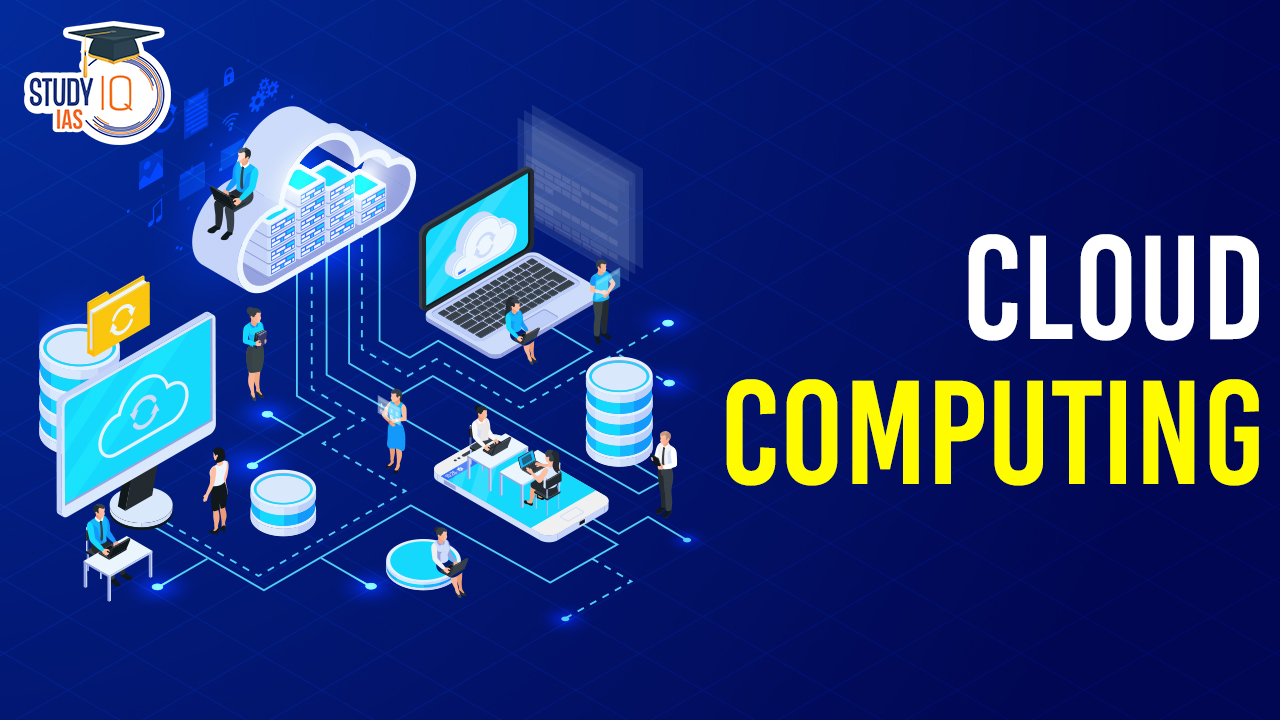Table of Contents
Cloud computing delivers computing services over the internet, including servers, storage, and software, on a pay-as-you-go basis. It offers on-demand, scalable, and cost-effective solutions, making it accessible from anywhere. Cloud services include Infrastructure as a Service (IaaS), Platform as a Service (PaaS), and Software as a Service (SaaS). Public, private, and hybrid cloud deployment models cater to different needs. Cloud computing has revolutionized how businesses and individuals access and manage computing resources, enhancing flexibility and efficiency.
Cloud Computing
Cloud computing is the delivery of various services via the Internet. The term “cloud computing” comes from the fact that the internet is often visualized as clouds.
Cloud computing allows users to access database resources via the internet from anywhere, for as long as they need, without worrying about any maintenance or management of actual resources.
Cloud services facilitate the flow of user data from front-end clients (e.g., users’ servers, tablets, desktops, laptops—anything on the users’ ends), through the internet, to the provider’s systems, and back.
Examples of these resources include Data storage, Servers, Databases, Networking, and Software.
We’re now on WhatsApp. Click to Join
Cloud Computing in India
In recent years, cloud computing has gained widespread use in India, becoming integral to people’s daily activities like social networking, email, and online shopping, and playing a crucial role in large-scale multinational operations such as big data and the Internet of Things (IoT). This technology presents substantial growth opportunities for Indian businesses, with sectors such as retail, railways, manufacturing, banking, education, and healthcare increasingly adopting cloud services.
In terms of regulation, while various laws like the Indian Telegraph Act of 1885, the Civil Procedure Code of 1908, and the Telecom Regulatory Authority of India Act of 1997 touch on aspects of this sector, it is the Information Technology (IT) Act of 2000 that primarily governs it. This comprehensive Act includes provisions for penalties related to data breaches and privacy violations, addressing broader issues like e-commerce, cybercrime, data protection, and privacy.
However, it’s worth noting that while these laws touch on certain legal aspects of cloud computing, they may not fully encompass the scope of cloud computing services and the specific issues that may arise in this rapidly evolving technology landscape.
Features of Cloud Computing
Cloud computing possesses several salient features:
- On-Demand: Users can access and pay for resources as needed, typically on a per-minute or per-hour basis.
- Elastic: Users can scale services up or down based on their requirements, providing flexibility and cost-efficiency.
- Fully Managed: Cloud services are maintained and managed entirely by the provider, eliminating the need for users to manage physical infrastructure.
- Data-Intensive: Emphasis is on data storage, processing, and management, making it ideal for data-centric applications.
- Scalability: Cloud services can adapt to changes in size or workload, ensuring they perform well under varying demands.
Deployment Models:
- Public Cloud: Resources are available to the general public.
- Private Cloud: Resources are exclusively used by a single organization.
- Community Cloud: Resources are shared by a specific community or group of organizations.
- Hybrid Cloud: Combines multiple deployment models to meet specific needs.
Service Models:
- Infrastructure as a Service (IaaS): Provides virtualized computing resources, including servers and storage.
- Platform as a Service (PaaS): Offers a platform for developers to build, deploy, and manage applications without dealing with the underlying infrastructure.
- Software as a Service (SaaS): Delivers software applications over the internet, accessible through web browsers on a subscription basis.
Applications of Cloud Computing
Cloud computing has a wide range of applications across various industries. Some common applications of cloud computing include:
- Web Hosting: Cloud hosting services allow websites to be hosted on scalable, reliable cloud infrastructure, ensuring high availability and performance.
- Data Storage and Backup: Cloud storage services like Dropbox, Google Drive, and Amazon S3 provide cost-effective and scalable data storage solutions with easy access and backup options.
- Business Continuity and Disaster Recovery: Cloud-based disaster recovery services enable organizations to back up critical data and applications, ensuring business continuity in case of unexpected events.
- Software Development and Testing: Cloud platforms offer tools and infrastructure for software development, enabling developers to build, test, and deploy applications efficiently.
- Content Delivery: Content delivery networks (CDNs) use cloud resources to distribute web content, ensuring fast and reliable delivery to users worldwide.
- Big Data and Analytics: Cloud-based big data and analytics platforms allow organizations to process and analyze vast amounts of data, making data-driven decisions and insights more accessible.
- IoT (Internet of Things): Cloud computing supports IoT applications by providing a scalable and secure infrastructure for collecting, processing, and analyzing data from IoT devices.
- Virtual Desktop Infrastructure (VDI): Cloud-based VDI solutions enable remote access to desktop environments, enhancing flexibility and mobility for businesses.
- Artificial Intelligence (AI) and Machine Learning (ML): Cloud platforms offer powerful AI and ML tools and resources, making it easier to develop and deploy AI-driven applications.
- E-commerce: Cloud computing supports online retail by providing scalable and secure hosting, payment processing, and inventory management solutions.
- Healthcare: Cloud-based healthcare solutions offer secure storage and access to patient data, telemedicine services, and collaborative tools for medical professionals.
- Education: Cloud-based educational platforms enable remote learning, collaboration, and access to digital resources for students and educators.
- Gaming: Cloud gaming services stream games from remote servers, eliminating the need for powerful local hardware, offering a broader audience the opportunity to play resource-intensive games.
- Video Streaming: Cloud-based video streaming services like Netflix and YouTube leverage cloud infrastructure to deliver high-quality video content to users worldwide.
- Financial Services: Cloud computing supports financial institutions with secure and scalable solutions for data analysis, risk assessment, and customer services.
- Government Services: Governments use cloud computing for data storage, citizen services, and disaster recovery to provide efficient and cost-effective public services.
Benefits of Cloud Computing
- Cost-Efficiency: Reduces capital expenses and offers a pay-as-you-go model.
- Scalability: Quickly adapts to changing workload demands.
- Global Accessibility: Enables remote access and collaboration.
- Productivity: Frees IT teams from maintenance tasks.
- Performance: Utilizes high-quality infrastructure.
- Reliability: Enhances data backup and disaster recovery.
- Security: Implements robust data protection.
- Automatic Updates: Provides access to the latest features.
- Collaboration: Supports real-time teamwork.
- Innovation: Facilitates rapid application development.
- Data Analytics: Extracts insights from large datasets.
- Competitive Edge: Adapts to changing market conditions.
- Accessibility: Works on various devices for user convenience.
Cloud computing UPSC
Cloud computing offers accessible and cost-effective computing services via the Internet. It empowers users with on-demand, scalable resources while eliminating the need for infrastructure management. Deployment models like public, private, and hybrid clouds cater to diverse needs. This technology has transformed various sectors in India, including retail, banking, and healthcare, fostering innovation and growth. Regulatory frameworks like the IT Act of 2000 address legal aspects. Cloud computing applications span web hosting, data storage, disaster recovery, and more, enhancing productivity and collaboration. Its key benefits include cost savings, scalability, reliability, security, and support for innovation, making it a competitive advantage in the digital era.


 Advanced Air Defence Radars: Types, Comp...
Advanced Air Defence Radars: Types, Comp...
 Ion Chromatography, Working and Applicat...
Ion Chromatography, Working and Applicat...
 Broadly Neutralising Antibodies (bNAbs):...
Broadly Neutralising Antibodies (bNAbs):...




















